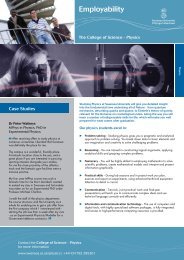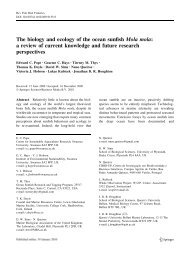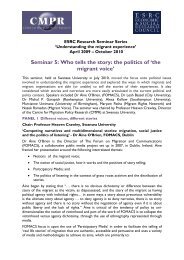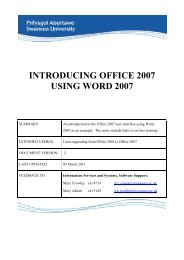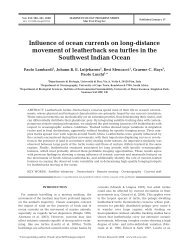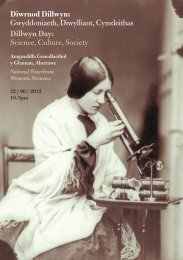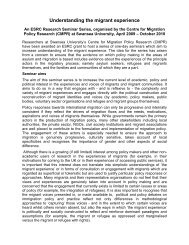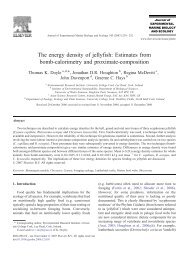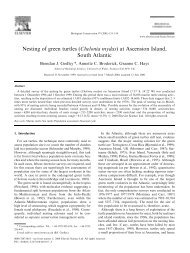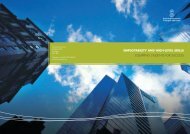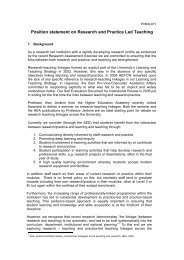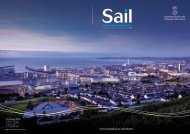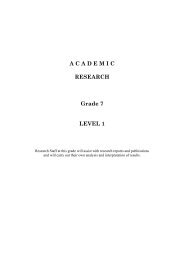Postgraduate Prospectus 2013 - Swansea University
Postgraduate Prospectus 2013 - Swansea University
Postgraduate Prospectus 2013 - Swansea University
Create successful ePaper yourself
Turn your PDF publications into a flip-book with our unique Google optimized e-Paper software.
Media and Communication Studies<br />
Entry requirements<br />
Normally a minimum of a lower class BA<br />
Honours degree 2.2 (with an overall average of<br />
55% or above) in a related subject.<br />
English Language requirement:<br />
IELTS 6.5 (with a minimum of 6.5 in each<br />
component) or <strong>Swansea</strong> <strong>University</strong><br />
recognised equivalent.<br />
<strong>Postgraduate</strong> Diplomas<br />
and Certificates<br />
Full-time or part-time <strong>Postgraduate</strong><br />
Certificate (60 credits) or <strong>Postgraduate</strong><br />
Diploma (120 credits) is available.<br />
From traditional print and broadcast<br />
media to digital publishing, social<br />
networking, and public relations, the<br />
media increasingly defines the way we<br />
interact with our society. It shapes the way<br />
we see ourselves and others, and can be<br />
a powerful tool for social change, good<br />
or bad.<br />
Media and Communication Studies at<br />
<strong>Swansea</strong> has a broad vocational and<br />
international outlook that reflects the<br />
challenges of our media-rich world.<br />
These degrees will:<br />
• equip you with skills relevant for a<br />
rewarding career in a diverse range of<br />
media-related industries<br />
• help you to gain transferable skills,<br />
including team working, communication,<br />
presentation, and analytical skills<br />
• prepare you for a research degree<br />
How the degrees are structured<br />
The full-time course structure is split across<br />
the year with three modules offered in each<br />
academic semester (a total of six modules<br />
in Part One) and then a dissertation or<br />
practice-based project (applicable to<br />
Communication, Media Practice and Public<br />
Relations only) over the summer (Part Two).<br />
The dissertation component is written on a<br />
specialist research topic of your choosing.<br />
Part-time students normally study three<br />
modules in their first and second year and<br />
write their dissertation in the third year.<br />
The College has computer labs with<br />
Apple computers to learn creative digital<br />
skills, radio and TV studios, video and film<br />
MA Comparative Journalism<br />
The MA in Comparative Journalism<br />
provides a cross-cultural approach to<br />
journalism in the twenty first century. It is<br />
aimed at those interested in developing<br />
their knowledge and understanding of the<br />
role of contemporary global society, and<br />
exploring how journalism is evolving in the<br />
ever-changing communication environment<br />
characterised by digital technologies.<br />
The course provides students with essential<br />
knowledge of how journalism is practiced<br />
in different cultures worldwide as well as<br />
responding to their interest in comparative<br />
study in the field of journalism and<br />
communication studies. Students are<br />
encouraged to focus on a comparative<br />
approach in journalism studies and<br />
develop cross-cultural themes by drawing<br />
on multidisciplinary research from a variety<br />
of fields as well as countries.<br />
production and editing equipment and film<br />
viewing facilities.<br />
In addition you will gain practical<br />
experience and benefit from a programme<br />
of visiting lecturers, many of them industry<br />
professionals with first-hand experience of<br />
working in different areas of the media.<br />
Scholarships and Bursaries<br />
A range of postgraduate scholarships and<br />
bursaries is available. For details, please<br />
visit: www.swansea.ac.uk/scholarships/<br />
<strong>Postgraduate</strong><br />
MA Digital Media<br />
This programme offers an innovative,<br />
interdisciplinary and multidisciplinary<br />
approach to contemporary technology<br />
and new media, drawing upon expertise<br />
in Media and Communication Studies to<br />
examine some of the key issues<br />
confronting twenty first century global<br />
societies through a dynamic programme<br />
that combines theoretical and applied<br />
perspectives.<br />
Students will be encouraged to apply<br />
media theory, political and social theory,<br />
and research tools in analysing and<br />
understanding digital media, as well as<br />
teaching key historical, policy and<br />
practice dimensions of new media.<br />
How can I find out more?<br />
Visit our website:<br />
www.swansea.ac.uk/artsandhumanities<br />
Contact the Arts and Humanities<br />
<strong>Postgraduate</strong> Office:<br />
Email: pgahadmissions@swansea.ac.uk<br />
Tel: + 44 (0)1792 606980/606981<br />
Visit the <strong>University</strong>:<br />
see page 174 for details<br />
Applications can be made online at:<br />
www.swansea.ac.uk/applyonline<br />
– see pages 176 – 177 for further<br />
information<br />
MA Communication, Media Practice<br />
and Public Relations/European MA<br />
in Communication, Media Practice<br />
and Public Relations<br />
These programmes offer syllabus-based<br />
practice in professional, contemporary<br />
media skills, taught by industry<br />
professionals with academic<br />
backgrounds. The programme includes<br />
modules in Professional Writing/<br />
Journalism, Visual Communication and<br />
Media Design, Video and Documentary<br />
Making, and PR, Branding and<br />
Promotion. Other modules in<br />
communication, theory, film and history<br />
are also available.<br />
The programmes allow graduates to add<br />
valuable and desirable professional<br />
media skills for careers in business, public<br />
and media relations, broadcasting,<br />
advertising and marketing and they also<br />
allow industry professionals to acquire<br />
new media skills and qualifications that<br />
will enhance their continuing professional<br />
development.<br />
The European Master’s degree is intended<br />
for graduates who wish to acquire<br />
professional skills, which will be<br />
recognised across the European Higher<br />
Education Area.<br />
Assessment<br />
The degrees are assessed by coursework<br />
with a final project incorporating the<br />
practical elements of the course and a<br />
short-term work placement.<br />
“The MA in Comparative Journalism provided me with a good<br />
balance of theoretical knowledge and practical journalism skills,<br />
enabling me to approach news and feature writing in an effective way<br />
and develop a strong portfolio of work. Alongside these modules the<br />
course’s global approach to journalism helped me to develop a wider<br />
view of world media and appreciate the importance of new<br />
technologies in publishing - something that has come in very useful as I<br />
now work as a web editor for an international magazine based in<br />
Shanghai, China.<br />
”<br />
Claire Slobodian,<br />
MA in Comparative Journalism<br />
Master’s Degrees – Media and Communication Studies<br />
74<br />
75



